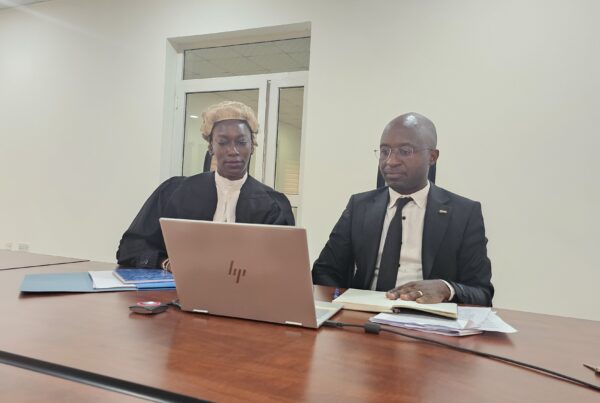In March 2004, the judicial apparatus Gambia signed a memorandum with the UK government through the Department for International Development (DfID) for funding of anera phase a three-year program capacity building in the Gambia, the Legal Capacity-Building Programme (LCBP) – 2004-2007.
The IHRDA was commissioned by DfID for the LCBP direct and coordinate the various activities covered by this program of capacity building. It is in this context that the IHRDA served in the 1st phase of the LCBP as project manager. This function included her work as an intermediary between DfID and the judiciary, technical assistance in organizing workshops and providing the human rights dimension in the training. The IHRDA also participated in the review of funding requests submitted by various players in the court in The Gambia. This has fostered a greater flexibility in adapting to the changing needs of the program during the three years of the 1st phase of the project.
The IHRDA also contributed to the implementation of human rights component of the program. He therefore chose to focus on access to justice, and over time, was confined to legal assistance.
The intention behind the LCBP is the strengthening of the judiciary in the Gambia and the intrusion of reforms in the administration of courts, decentralization and the extension of access to justice in rural areas. The LCBP is a vital project because it contributes to the development of an organized and independent judiciary.
Objectives of the LCBP
The LCBP was designed to make the Gambian judiciary accessible and effective for the majority of citizens in contributing to capacity building of its staff as well as from the department of justice in general. This broad objective is focused around nine key objectives:
- Strengthen the capacity of courts so as to minimize the delay in processing cases;
- Strengthen the capacity and efficiency of courts through the establishment of a system of electronic case management;
- Improving fiscal performance through the establishment and maintenance of a self-assessment of financial
- Educate judges and magistrates on the need to use new legislation and international standards;
- To further boost the effectiveness of clerks and sheriffs in the business and the implementation of judicial decisions;
- Increase the moral probity, professional and team spirit within the judiciary;
- Make sure that key officers are better equipped to perform their tasks within the justice sector;
- Contribute to the emergence of police personnel legally able to represent the Crown in the courts (magistrate courts);
- Make sure that the Presiding District Tribunals Panels and staff are able to perform their tasks properly respecting the existing legal texts.
The first year of implementing the first phase of the LCBP was particularly focused on training workshops designed to put participants in touch with a wide range of topics on judicial reform.
During the second year, the focus was on strengthening the internal capacity of training including training of staff members can train their colleagues in the various judicial institutions. The third year was focused on several consultancy work for the effective implementation of the project began during the first two years with activities such as implementation of Computer Aided Transcription System (CATS) in one of the High Courts of Gambia.
The first phase of the LCBP has achieved in the following areas:
- A significant number of activities have been completed;
- Visibility of relapsed several reforms undertaken by the judiciary;
- The High Court has been totally restructured, leading to improved efficiency in processing cases;
- The restructuring and other reforms have reduced the backlog of cases;
- Improving the quality of decisions from lower courts, especially courts of first instance (Magistrate courts) during the implementation of the program;
- A code of ethics for the judiciary in Gambia Assisi was developed and implemented. This code has fostered an improved relationship between judges and lawyers;
- Recruitment of other judges reduced the backlog in complaints;
- Many workshops have been organized.
The success of the 1st phase of the LCBP was largely due to the flexibility it had offered to the judiciary and other stakeholders in the justice sector in the Gambia in making their programs, so as to adapt to changing realities.
It should be noted that the second phase of the LCBP is still ongoing although it is not administered by IHRDA. The success of the 1st phase of the LCBP is a breakthrough in efforts to translate the Gambian judiciary in reality the right of access to justice and symbolize the same time, the result which could be reached when the willingness to change. The IHRDA is proud to have administered the 1st phase of the LCBP.
Complete list of training activities performed in the first phase of da LCBP





